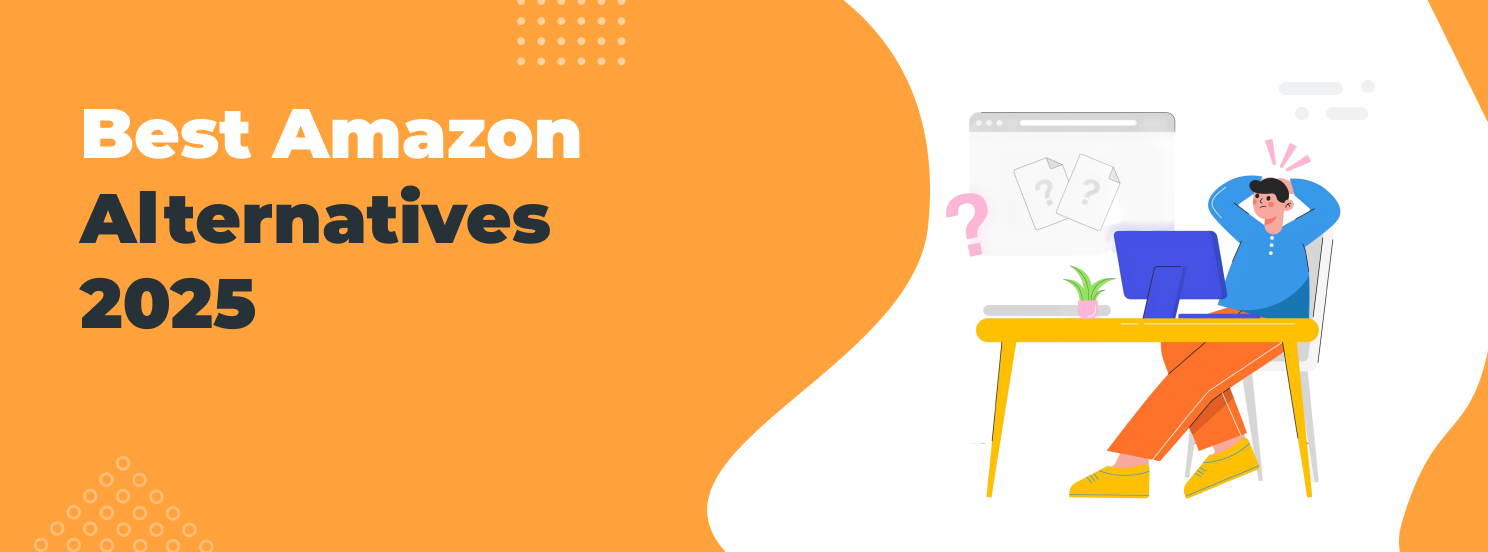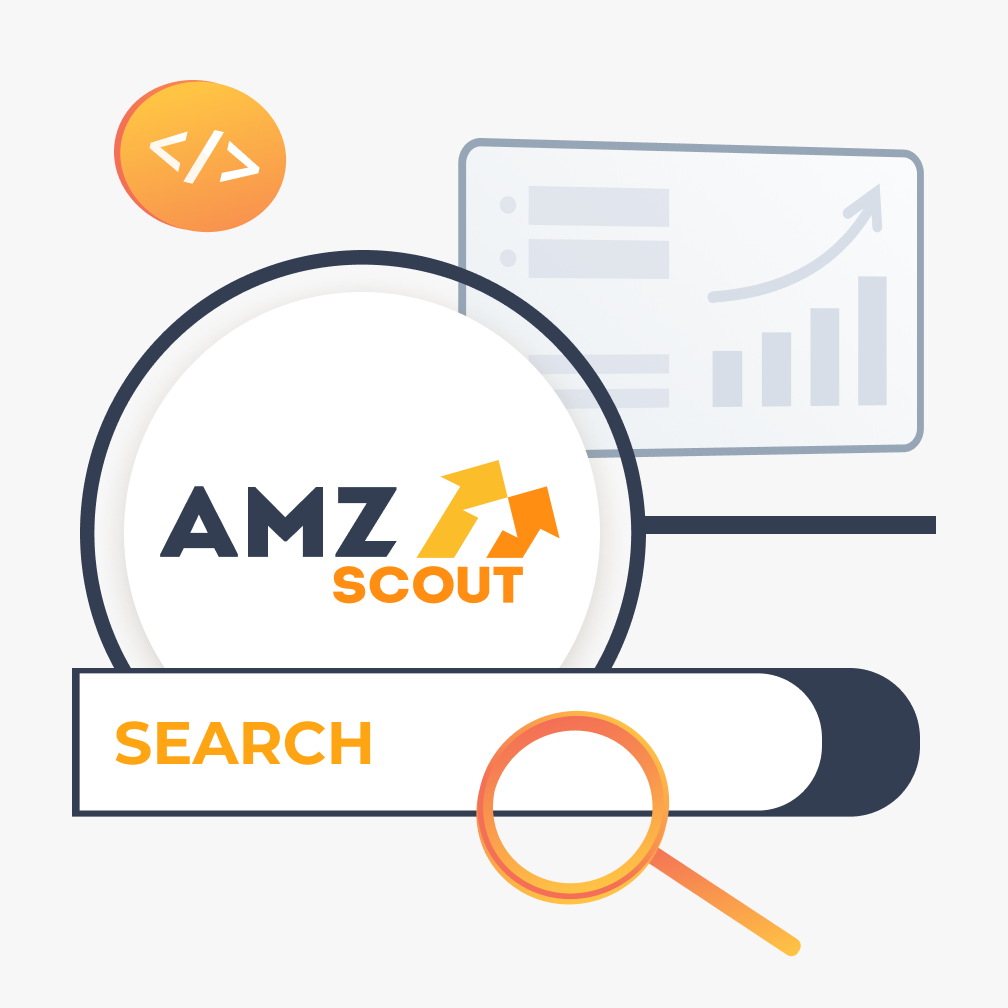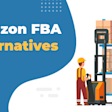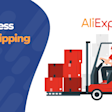
10 Best Websites Like Amazon for Sellers in 2025
In 2025, many sellers and shoppers are looking for Amazon alternatives that provide more flexibility, fair fulfillment options, and better overall experiences. Whether you sell books, handmade items, or everyday products, there are top websites like Amazon where to shop or sell that might suit you—and your customers—better. This guide will explore those platforms, offering FBA-style fulfillment support and solutions to common Amazon challenges.
Table of contents
Why Consider Amazon Alternatives?
While Amazon still dominates the eCommerce landscape, it’s far from perfect—especially for sellers and conscious shoppers in 2025. The rising interest in websites like Amazon is fueled by a growing desire for more sustainable, ethical, and profitable options. Whether you're looking to build a unique brand, find cheaper fulfillment, or simply explore better places to shop online, considering alternatives to Amazon can unlock real advantages.
1. Escape the Fee-Heavy, High-Competition Chaos
Amazon's convenience comes at a cost, literally. From referral fees to FBA charges, the platform can quickly eat into a seller's margins. And the competition? Brutal. According to data from the AMZScout PRO AI Extension, 7 out of 10 niches are classified as medium competition or higher, making it fairly difficult to find products with low competition. Even in niche markets like reusable water bottles, sellers face strong competitors with hundreds or thousands of reviews, advanced PPC tactics, and Prime badges. For small businesses or new sellers that’s an uphill battle with little breathing room.
2. Build a Brand, Not Just a Product Listing
Amazon’s cookie-cutter product pages don’t leave much space for creativity or storytelling. Alternatives like Etsy or Uncommon Goods offer more customizable storefronts, letting you express your values, whether you’re focused on eco-friendly items, ethical products, or limited-edition goods. This is especially important if you’re trying to create a strong connection with modern consumers who want to know the story behind what they’re buying.
3. Tap Into New Audiences with Less Saturation
Let’s be real: shoppers are exploring other places to buy online, from Facebook Marketplace to niche marketplaces that prioritize sustainable products or indie brands. Many of these similar websites have fewer sellers, giving you a better shot at visibility without constantly battling for the Buy Box. Plus, you’re not competing with Amazon’s own private label products, which is a major win in itself.
Bottom line? If you're a seller who wants more control, better margins, and a chance to stand out—or a buyer seeking ethical shopping sites, budget deals, or Amazon competitors that align with your values—it’s time to start exploring the growing list of websites like Amazon that are rewriting the rules of online selling and shopping.
10 Best Amazon Alternatives for Sellers in 2025
Ready to branch out beyond Amazon? The good news is, you're not short on options. Below are the ten best websites like Amazon for sellers in 2025, each offering unique strengths, loyal customer bases, and promising opportunities.
1. Walmart Marketplace
In 2025, Walmart stands out as a solid Amazon alternative thanks to lower fees, fewer competitors, and programs like Walmart Fulfillment Services (WFS), similar to Amazon’s FBA. As we explain in our full guide to selling on Walmart, key perks include high traffic—almost 500 million monthly visitors—low advertising costs, and the credibility that comes with the Walmart name. According to Walmart Marketplace, there are no upfront or recurring charges to become a seller. It’s a great option for sellers looking to expand their reach in the USA while keeping control over their margins. Moreover, it's equally attractive for buyers looking for reliable, budget-conscious shopping alternatives.
2. eBay
eBay remains a top choice for sellers of used, refurbished, collectible, or niche items. Its auction model, global reach, and audience of bargain hunters make it ideal for resellers and part-time sellers looking to avoid Amazon’s FBA competition. Unlike Amazon, eBay offers more pricing control and direct buyer interaction, helping build trust and repeat business.
Our step-by-step guide to selling on eBay covers benefits like low startup costs, fewer product restrictions, and the freedom to manage your store your way. For most casual sellers, it’s free to list on eBay. If you list more than 250 items per month, you’ll pay a $0.35 insertion fee per listing. Category exclusions apply. Additionally, eBay charges a per-order fee of $0.30 for orders $10 or less, and $0.40 for orders over $10.Whether flipping electronics or selling vintage finds, eBay is a strong Amazon alternative for all sellers.
3. Etsy
If you’re an artist, maker, or small-batch seller, Etsy is a top Amazon alternative in 2025. It’s designed for handmade, vintage, and custom products, perfect for creators and boutique brands wanting to stand out. Etsy attracts a loyal global audience that values unique, sustainable, and ethical products.
Beyond selling, it offers a community where you can share your story and build a following.Our beginner’s guide to starting an Etsy shop explains how easy it is to set up, optimize, and start selling without the heavy competition and fees of Amazon.
4. Target Plus
For established brands with quality products, Target Plus is one of the most promising Amazon alternatives in 2025. This exclusive, curated marketplace offers less competition and higher quality, backed by Target’s trusted reputation. The platform’s approval is selective, but once in, your products gain exposure to millions of loyal Target shoppers online and in-store. Ideal for proven brands, Target Plus provides visibility, credibility, and a premium retail environment, making it a smart choice for long-term growth beyond Amazon.
5. Facebook Marketplace
For casual sellers, side-hustlers, or anyone looking to move products quickly without high fees or logistics hassles, Facebook Marketplace is one of the most flexible Amazon alternatives. It’s a hyper-local, user-friendly platform with low upfront costs, ideal for flipping items, selling secondhand goods, or testing new products.
With Facebook’s huge reach and low-cost ads, it’s easy to boost visibility and connect with nearby buyers in real time.On average, Facebook ads cost around 70¢ per click and about $12.74 per 1,000 impressions, making it a cost-effective way to drive traffic without breaking the bank. In our full guide to selling on Facebook Marketplace, we break down how to list products, manage conversations, and safely complete transactions.
6. Thrive Market
If you sell organic, wellness, or sustainable products, Thrive Market is a top Amazon alternative for 2025. This members-only marketplace focuses on healthy, eco-friendly goods and attracts loyal, health-conscious shoppers. For sellers, it offers alignment with a mission-driven brand and access to a niche audience that values transparency, sustainability, and quality.
7. EarthHero
For eco-conscious sellers, EarthHero stands out as a leading alternative to Amazon in 2025. This curated marketplace features only sustainable, ethically made products for lifestyle, home, and travel. Its audience values transparency and seeks brands that reflect their environmental values. Unlike larger platforms, EarthHero vets every product, helping your eco-friendly items stand out from similar companies and reach consumers who care about conscious shopping.
8. Bookshop.org
For authors, book retailers, and sellers who support independent bookstores, Bookshop.org is a meaningful Amazon alternative in 2025. It makes selling books easy while benefiting local communities and appealing to ethical readers.
Authors and affiliates typically earn 10%–30% per sale on Bookshop.org, compared to Amazon’s average affiliate rate of just 4.5% for books. Each purchase also helps fund independent bookstores across the U.S., creating a ripple effect of community support.
9. Uncommon Goods
If you offer unique, handmade, or fair trade products, Uncommon Goods is a top Amazon alternative for creative entrepreneurs. Unlike Amazon’s vast and often crowded marketplace, Uncommon Goods is highly curated, giving your products greater visibility among shoppers specifically looking for one-of-a-kind, ethically made items.
10. Hive Brands
Hive Brands is a curated, sustainability-focused marketplace that offers a strong Amazon alternative for 2025. Every brand on Hive is vetted against more than 45 sustainability criteria, giving sellers credibility and aligning them with a mission-driven audience.
While Amazon can be overwhelming with its sheer volume and inconsistent product values, Hive Brands offers a clean, trusted environment where 92% of shoppers say they buy with purpose.
Avoiding Common Amazon Pitfalls
Even seasoned sellers can stumble in the fast-paced world of Amazon. Between juggling inventory, optimizing listings, and keeping up with competitors, it’s easy to make mistakes that eat into your profits or stall your growth. Whether you’re selling on Amazon or using alternative platforms like Etsy, eBay, or Thrive Market, avoiding these common mistakes helps future-proof your business and keep your listings competitive.
1. Don’t Let Inventory Run the Show
Inventory mismanagement is one of the quickest ways to lose sales or sink your seller rating. Overstocking ties up your cash, while stockouts mean missed opportunities and unhappy customers. Use demand forecasting tools and track seasonal trends to stay ahead. Diversifying your sales across websites like Amazon also helps reduce risk and spread out inventory across multiple channels.
2. Get Your Pricing Right, Every Time
Underpricing cuts into profits, while overpricing turns shoppers away, especially when competing with budget-focused platforms or Prime-ready listings. Instead of guessing, look at competitor pricing and factor in fees, fulfillment costs, and desired margins.
Tools like AMZScout’s Product Database can help by giving you access to price history and competitive insights across millions of Amazon listings. You can use filters to track how prices fluctuate over time, identify pricing sweet spots, and compare products in your exact price range. This helps you avoid undercutting yourself or overpricing out of the market, ensuring your strategy stays both data-driven and profit-focused.
3. Use the Right Keywords—or Be Invisible
A great product means nothing if no one sees it. One of the most common mistakes sellers make is ignoring keyword research or choosing the wrong ones. That’s where AMZScout’s Keyword Search tool comes in. It helps you uncover high-volume, low-competition keywords by analyzing monthly search volume, relevance, and keyword trends. This ensures your listings are optimized to rank higher and attract more of the right buyers, whether you’re selling on Amazon or creating listings on similar websites and marketplaces.
With the right tools and strategies, avoiding these common Amazon slip-ups becomes second nature. Whether you’re scaling on Amazon or branching out to other online marketplaces, these best practices will help you stay sharp, profitable, and one step ahead.
FAQs
Who is Amazon's best competitor?
Amazon has several strong competitors, but Walmart Marketplace is often considered the closest match. With its vast customer base, brick-and-mortar presence across the USA, and growing third-party seller platform, Walmart offers wide visibility and lower selling fees. Other top Amazon alternatives include eBay for resellers, Etsy for handmade goods, and Target Plus for premium brands, all offering unique advantages that rival Amazon in different ways.
Is Amazon the best online store?
Amazon is undeniably one of the largest and most convenient online shopping platforms, but “best” really depends on what you're looking for. If speed, selection, and Prime perks are your top priorities, Amazon delivers. But if you're looking for ethical products, better brand transparency, or sustainable shopping, you might find more value in alternatives to Amazon like Thrive Market, EarthHero, or Bookshop.org. Many of these platforms offer a more intentional, conscious shopping experience.
Is Etsy more ethical than Amazon?
In many ways, yes. Etsy supports small businesses, independent artisans, and handmade or vintage goods, making it a go-to for shoppers who prioritize ethical buying, sustainability, and transparency. Unlike Amazon, Etsy doesn’t compete directly with its sellers or mass-produce its own private-label versions. It's a more curated, community-driven platform that allows sellers to tell their story and maintain full creative control.
Conclusion
In 2025, eCommerce success comes from choosing the right platforms that align with your products, brand, and values, whether it's Amazon, Walmart Marketplace, Etsy, or Thrive Market. With AMZScout’s tools, you can uncover trends, find winning products, and make data-driven decisions that set you apart across the entire eCommerce landscape. The future of selling is flexible, ethical, and full of opportunity, so now’s the perfect time to explore what’s next.








